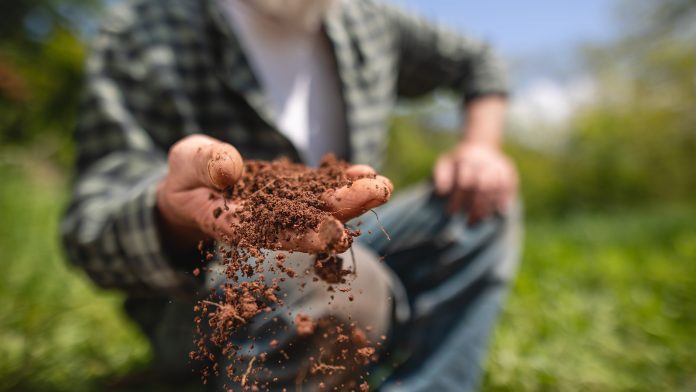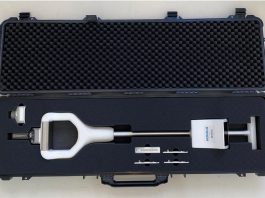Liz Bowles, Associate Director of Farming and Land Use at Soil Association, discusses the importance of healthy soil in ensuring the sustainability of farming.
Soils hold three times as much carbon as the atmosphere and five times as much as forests, making them the largest land-based store of carbon on Earth. Healthy soils are essential for water quality too, as they retain more water which reduces soil erosion, prevents floods and droughts and supports healthy crops.
But our soils are in danger. The UK’s arable soils have lost 40-60% of their soil carbon already and one-third of arable soils worldwide are degraded. We urgently need action to prevent irreversible damage to our land and soil which is impacting ecosystems across the planet. Intensive farming – and heavy reliance on pesticides – has been identified as a key driver of soil degradation, as well as driving the declines of UK wildlife, including in birds, mammals, and insects, many of which are at risk of extinction. Worldwide, the global food system is also responsible for around one third of total man-made green-house gas (GHG) emissions.
In addition to the climate and nature crises, we face a third, equally important challenge – a global dietary health crisis. With 1.9 billion adults overweight or obese worldwide, 462 million underweight, a third of our food wasted, and many farmers struggling to afford to feed themselves, it is clear our food system is broken.
There is hope, though; we can feed the world healthy and sustainable diets, but we urgently need to join the dots between the climate, nature, and health crises – and recognise that the future structure of UK farming, including soil health and supporting wildlife, is critical to the health of people and the planet.
We must move away from the intensive farming methods which contribute to soil erosion, chemical run-off into water systems, and cause some weeds and insects to become resistant to weed-killers and pesticides. Applications of artificial fertiliser, which are very energy intensive to make and release the greenhouse gas nitrous oxide, have contributed to soil degradation, allowing for the release of carbon. Without reversing soil degradation, we simply cannot halt climate change – which has led the Royal Society to highlight soils as a top priority alongside tree planting for absorbing carbon from the atmosphere.
Farming with nature
The good news is that many farmers are leading the way in looking after our soils by working with nature, not against it. Organic farming means lower levels of pesticides, no manufactured herbicides or artificial fertilisers, and environmentally sustainable management of the land and natural environment. Organic farms have on average 44% more soil carbon, and 50% more wildlife. Plenty of non-organic farmers are also paving the way for a transition to agroecology, which uses natural systems first and chemicals last.
Nature friendly, agroecological farming – like organic – includes practices such as longer crop rotations including cover crops like clover grown between crops so the soil isn’t left bare and releasing carbon, growing a more diverse range crops instead of single crop monocultures, and planting trees on farms via agroforestry. These methods can help to manage weeds, reduce erosion, provide for better soil fertility, improve carbon storage and even boost crop yields – reducing the need for harmful chemical inputs.
For example, to grow cereals like wheat and barley, farmers need to build fertility into the soils to provide nutrients like nitrogen. As making synthetic nitrogen is very energy intensive and contributes to greenhouse gas emissions and soil erosion, it is less damaging if farmers rotate their cereal crops with grassland containing legumes like clover and sainfoin or grow crops such as pulses within the rotation which fix nitrogen into the soil. Including grass clover leys within the rotation leaves the soil undisturbed for a period, and the legumes naturally pull nitrogen from the atmosphere into the soil. When you allow animals to graze these crops – provided they aren’t overstocked – they can bring additional benefits, like building organic matter into the soil and supporting biodiversity.
A ten-year transition to agroecology
Moreover, a transition to agroecology is not just wishful thinking; it is a practical and viable solution to many major issues which confront our societies today – including climate change, biodiversity decline, and poor dietary health. French policy research institute IDDRI has shown that if Europe transitioned all its farms to agroecological farming systems over the next ten years, we could eliminate chemicals and imports of animal feed, restore biodiversity and soil health, and cut agricultural greenhouse gas emissions by 40% – all while feeding a growing European population a healthy diet.
IDDRI’s model for Ten Years for Agroecology is based on reducing inputs and phasing out pesticides and synthetic fertilisers. Instead, it relies on a transition to agroecological farming practices and a shift in our diets. This change would see us producing and eating more vegetables, fruit, nuts, and pulses, and reducing meat consumption. It confirms we need to eat less but better meat – something the Soil Association has long called for – replacing intensive, grain-fed meat with sustainably farmed, high welfare, grass-fed livestock. Intensive livestock farming is the main driver of tropical deforestation as forests are cleared to grow cheap animal feed, which currently uses around a third of the world’s croplands.
Farmer-led research
To support this transition, we need more studies exploring soil health and we need farmers – who know their land best – to lead that research. Programmes like Innovative Farmers, a not for profit network of farmers and growers running on-farm trials, show how invaluable these kinds of studies are. Seven farms are currently taking part in an IF field lab looking at the possibility of organic no-till farming in order to avoid the carbon that ploughing releases. Participants are exploring whether living mulch systems – mixing a cash crop like wheat and a cover crop – could eliminate the need for glyphosate, which conventional no-till farming often uses to remove the previous crop.
The GREATSoils project led by the Soil Association and funded by the Agriculture & Horticulture Development Board (AHDB), ran workshops, events, field trials, and field labs with growers, farmers, and advisors to improve soil health and proved a great success. With our support, farmers were able to put together handy blogs on looking after soil; webinars on measuring soil health; and a guide to soil health assessments varying from an easy spade test to a more complex earthworm count.
The Soil Association is also a partner in an EU project called FAB Farmers, to support farmers in the transition to agroecological farming practices. It aims to reduce reliance on external inputs, like chemical fertilisers and pesticides, by using methods that replicate natural, ecological processes and increase what is called the farm’s ‘Functional Agro-Biodiversity’ (FAB). This means that by working with nature and enabling ecosystems to function effectively, farms can become more resilient and sustainable. For example, a farmer group within the network has been learning about the benefits of planting more diverse, herbal grass leys, rather than planting just one type of grass, to help with soil and livestock health. Another group are looking at the value of overwinter grazing cover crops with sheep.
Farming for the future
We urgently need to create a resilient and sustainable food system that restores a safe climate, good nutrition, abundant nature, and healthy soils. IDDRI’s model for a ten-year transition to agroecology in Europe shows nature friendly farming can work at scale – we can feed a growing population healthily whilst drastically reducing our climate and nature impacts.
Government must support farmers in the transition to agroecology, working with farmers on sustainable solutions, supporting organic principles, and recognising our soils as an invaluable environmental resource. We can make personal choices that support sustainable food and farming too – like eating less but better meat and supporting agroecological and organic producers with small swaps as often as we can.
Together we can, and must, support a food and farming system that looks after our soils, and works for people, animals, and the natural world.
Liz Bowles
Associate Director of Farming and Land Use
Soil Association
+44 (0) 300 330 0100
Tweet @SoilAssociation
https://www.soilassociation.org/Email
Please note, this article will also appear in the second edition of our new quarterly publication.









